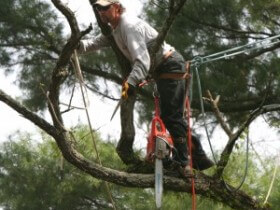Many people want a nice garden. For a garden full of healthy, vibrant plants, though, there are many factors you need to consider. Horticulture can be a lot of work, but it can also be a lot of fun. Below you will find some wonderful tips for making gardening more fun and less work!
Try planting berry-bearing evergreens in your yard. Your yard will then have bright spots of color all year round, which is especially cheerful in the winter when all of your other flora is bare or colorless. Some examples include Holly, Snowberry trees, Winterberry and similar plants.
Try to plan a variety of perennials that are slug-proof. Snails and slugs are garden nightmares, and only need a single evening to obliterate a plant. These pests normally go after plants with thin little leaves and plants that have yet to fully mature. There are perennials that slugs do not want to eat, the ones that they hate have hairy leaves, or are unappealing to their taste. Some perennial families that snails and slugs won’t eat include achillea, campanula, and helleborus.
Regular weeding is essential to the health of any garden. Weeds can take a promising garden and turn it into a shell of its potential. To help with the removal, you can use white vinegar. White vinegar is a fantastic weed killer! Apply it full strength to any areas where weeds are a problem.
Bulbs are the best solution to get flowers in spring and in summer. Most people have no trouble successfully growing bulbs, and their flowers will return each and every year. Specific types of bulbs usually bloom at specific times of the season, so if you make appropriate selections, you can be rewarded with blooms from the early part of spring to the later part of summer.
Try to grow some wheat or cat grass around your cat’s favorite plants. Try putting mothballs or citrus on your soil to wards pets away.
When mowing your lawn, avoid mowing the grass too short. Higher grass has deeper roots, meaning a healthier lawn that will be less likely to dry out. The shorter the grass, the shallower the roots, which makes the lawn more likely to develop brown patches.
Keeping pests out of a vegetable garden can be difficult. Since you are growing the vegetables for your own consumption, you want to stay away from pesticides. To safely keep your garden pest-free, keep a sharp eye out. If you catch the pests early, the best removal technique is just to take them off your plants by hand.
The nutrients from vegetables can help. If you steam your vegetables, you can pour the remaining water around them. If you have rhododendrons or gardenias, use coffee and tea grounds to acidify the soil. Some types of plant fungus problems can be solved by sprinkling with chamomile tea.
With these tips, you’re better equipped to grow the most beautiful garden you can imagine. In learning how to create your dream garden, you’ll also be growing as a person. That’s because learning how to nurture your plants will not only help you reach the goal of having a great garden, but it will help you learn to nurture yourself.




